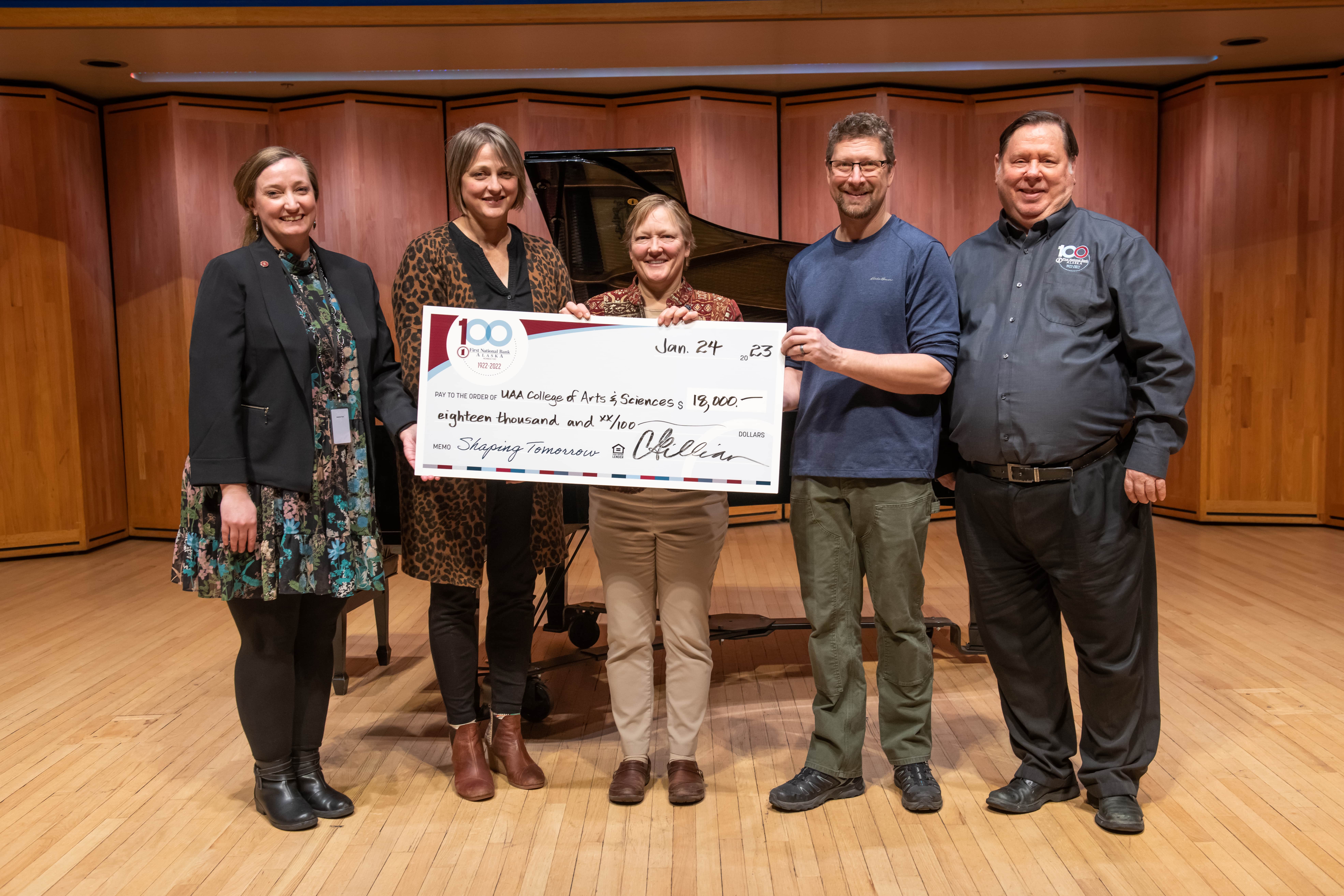OEC in Event Production and Partnership with ACPA
The College of Arts and Sciences, in partnership with the Alaska Center for the Performing Arts (ACPA), developed a new Occupational Endorsement Certificate (OEC) in Event Production. The OEC in Event Production is specifically designed to meet the needs of local performing arts agencies across the community and, ultimately, the state. The performing arts industry has been greatly impacted in the past couple of years by the pandemic. Canceled shows as a result of COVID lockdowns caused a reduction in the number of technical theater workforce that has significantly impacted our local arts community. The result is that only a handful of qualified technicians are available to support all of the arts events for the entire city. To continue drawing world class productions to our city, like ACPA has done with Broadway Alaska, we need a deep bench of technical staff that can manage all aspects of major productions. The OEC in Event Production was born in response to the need for a workforce development program that graduates trained event technicians for big productions, like those at ACPA, as well as for smaller productions in venues around the state. The program was designed in consultation with, and with considerable support from, ACPA.
Daniel Anteau, Professor of Lighting, Sound and Management and the new Fine Arts Building Managing Director, worked with Codie Costello, President & COO, ACPA to create this new OEC. Both sat down with us to discuss the development of the OEC, the partnership between CAS and the ACPA, and recent funding from First National Bank Alaska.
Dan, can you tell us a little more about the OEC, including the requirements?
“I wanted to keep the OEC in Event Production as easy to attain as possible, which meant keeping the credits to a minimum. For an OEC that means nine credit hours. To be successful in event production, you need to have a solid core amount of information and skills over a wide range of technical theatre type classes. With this in mind, I wanted to focus the OEC courses on one-credit courses. This allows the breadth of knowledge to be covered.
When we started developing the courses and requirements, we looked very closely at the architecture of the ACPA, especially their union crews. In the union crews, you have different divisions (costume and wardrobe, stagehand, carpentry, grips, rigging, lighting, and audio), and the core of the OEC classes come directly from those crew divisions.”
Codie, what are you most excited about with this OEC?
“I'm really excited about the quality of education that is going to be available. Beyond that, I am excited that it is going to be holistic in nature. People that go through the program are going to come out and be able to step right into working roles, whether it's here at the Alaska Center for the Performing Arts or elsewhere. They will be on par with colleagues in other locations and venues around the state, not just here in Anchorage.
Because of the training and the education, people who come out of the program will feel confident that they've received the level of training that's going to make them an excellent partner in the work that has to happen.”
Dan, can you speak about the recent donation from First National Bank Alaska?
“It was an incredible gift, and great news to hear. In order for this program to be successful, I feel like we have to be close to the leading edge of technology. We're going to be training people on lots of different elements of lighting or sound, and we want to be sure we are training them using the most modern technology out there. We are preparing people on what technology is used, how to work with that technology, and how to be successful using it. That's where First National Bank Alaska came in. They are helping to replace our outdated equipment, and provide us with the means to give our students access to the most cutting edge technology around. First National Bank Alaska is also responsible for helping build up the curriculum for the OEC.”
Codie, as a critical partner in developing the OEC, what impact did the FNBA gift have on the program and your perception of the program?
“To have a community partner invest in a program like this? It does so much. For starters, it validates our efforts and helps us to understand that the community surrounding us sees the value in what we do and what we represent. It is very validating to have that support come through. This community support also helps galvanize the partnership between CAS and ACPA, for the future of the program. It's helpful for the university to see the commitment from a partner like that as it shows the community saying ‘yes’ to a program like this.”
We reached out to First National Bank Alaska, and the First National Bank Alaska Board Chair and CEO/President Betsy Lawer had this to say:
“For more than a century, First National Bank Alaska and the University of Alaska have been part of Alaska’s rich history, working together to further student success, champion rural and indigenous education, and grow Alaska’s workforce and economy. We’re proud to support UAA’s College of Arts and Sciences Occupational Endorsement Certificate program and their partnership with Alaska Center for the Performing Arts to help train students in the technical and backstage theater arts, an area in need of skilled workers. Working together, we are bringing the educational resources our students and future leaders need to help shape a better tomorrow for all Alaska.”
Thank you Dan, Codie, and First National Bank Alaska! Keep up the great work!










